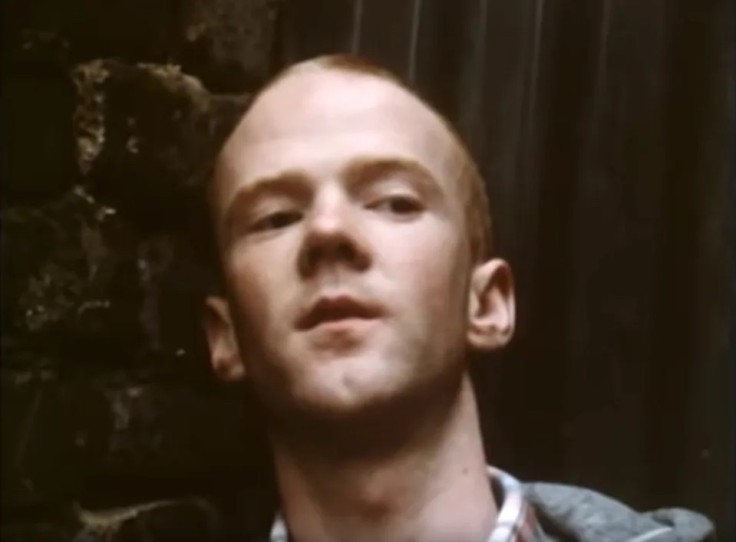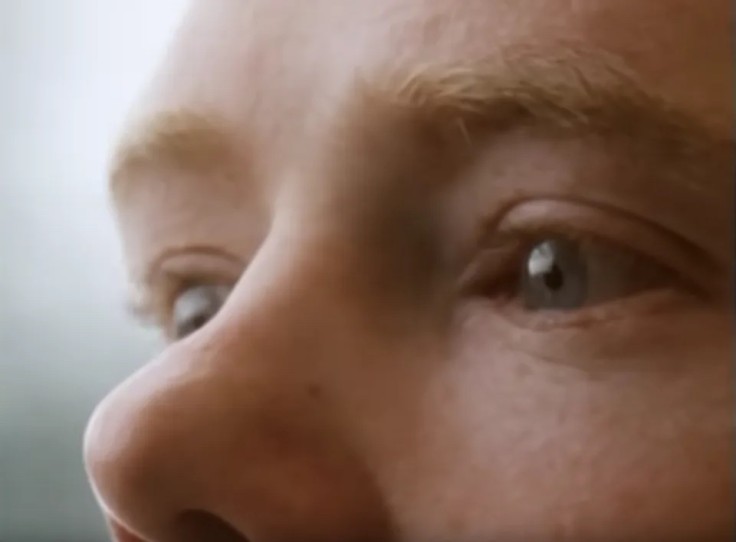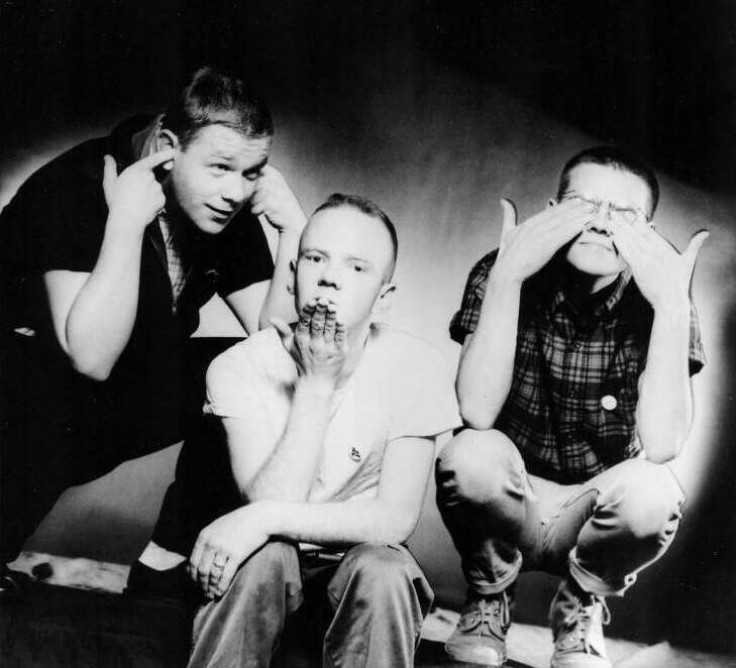
In 1984, director Bernard Rose lensed music videos for two important anthems that shifted the needle of queer culture. One was the original, wild, and widely banned version of Frankie Goes to Hollywood's controversial smash hit "Relax," which was shot in a Caligula-style S&M nightclub. But it was the other song, Bronski Beat's "Smalltown Boy," that truly went on to resonate over the next four decades. In 2021, it inspired a film-noirsh cover by gay country star Orville Peck, and in the past weeks it has sparked TikTok's #80sDanceChallenge, with Gen X-ers of all genders and sexualities breaking out their arm-flailing new wave club moves.
However, Rose's music video, which the director describes as an "un-glamorous" "silent movie," was a grim depiction of a suburban teen's gay-bashing and subsequent ostracization from his conservative, disapproving parents — starkly different from all those funny dancing-dad TikTok clips making the rounds.
"It's a piece of work that I'm still very proud of," Rose says in an interview commemorating both Pride Month and "Smalltown Boy's" 40th anniversary. "It was much quieter in its impact [at the time] than 'Relax,' but I think just as powerful in terms of the story it told. That was the good thing about it."
The narrative video — which, unlike other early-MTV videos, features no flashy performance footage, dance sequences, or garish neon fashions — depicts the titular character, played by the synth trio's openly gay frontman Jimmy Somerville, clumsily making a pass at a handsome, popular jock at a local swimming pool, only to be later viciously cornered and beaten in a dark alley by the swimmer and his homophobic gang. When the bruised and bloodied Somerville is escorted home by police and basically outed to his horrified mum and dad, he realizes that he has no choice but to leave town for somewhere more accepting. In the video's subtlest but most gut-punching scene, with the close-up camera focused solely on the two men's faltering hands, the father gives Somerville some wadded-up cash for the one-way journey — but refuses to hug his son goodbye or even shake his son's hand, instead cruelly walking away.
"I think it was a very common story, and I think that's a really interesting example of how to make a scene impactful just on the picture alone. I think it's a very common experience for people, and I think it even goes beyond the gay issue: people who just are rejected and thrown out like that," muses Rose. "That was Bronski Beat's message. They were going to point out the essential problems and oppressions involved in being gay at that time, which was you were quite likely to get beaten up somewhere, or thrown out by family. There's really no question that that's true. It is still true. In that sense, it was very bold."
Rose says he landed the "Smalltown Boy" directing job because of the success of "Relax," which sold 2 million copies in Britain alone and is still the sixth-best-selling single in U.K. history. But he admits that Bronski Beat initially "weren't very keen on the Frankie Goes to Hollywood thing. They were giving me a hard time about it. I think that they [thought it was too] mainstream, upbeat, and commercial, and they had more of a message... I do think their approach was much more politicized and much more serious."
However, Rose believes Frankie's chart breakthrough paved the way for "Smalltown Boy," Bronski Beat's statement-making first single (off their debut album, The Age of Consent), which eventually peaked at No. 3 in Britain. "There were a lot of artists [in the '80s] who were gay but not open about it, like Boy George, George Michael, Freddie Mercury, Elton John — these are people we now think have always been out, but they were not out in 1984. And they were all at the height of their fame. Frankie Goes to Hollywood were really the first ones who came out and said, 'Well, yeah, we're gay.' And it caused a shockwave, but it also didn't hurt them — it did the opposite."
Somerville wasn't a professional actor (and neither was the man who convincingly played the video's stern-faced policeman, London Records' openly LBGTQ+ executive Colin Bell), but his nuanced performance was so gripping because, as Rose explains it, "The story was very close to him. And we did it in real places, in a very low-key way. I just ran the scenes without too much rehearsal, so that they felt quite real, and then cut them to the music. There wasn't this thing of doing it to playback, which makes everything a bit artificial.
"This song, although obviously it's a dance record, the way it had a narrative to it, it was almost like a country & western record," adds Rose, almost foreshadowing that above-mentioned Orville Peck cover. "It had a very specific story in the lyrics, and it seemed it would lend itself to doing it in a naturalistic way that was very un-music-video-y."
Rose also made the decision to not actually overtly show Somerville's gay-bashing, mainly to conform to children's TV standards in Britain and thus get the airplay that the infamous "Relax" had understandably been denied. "There was no way you could have shown [the attack]," he says. "But I think in a weird way, it's quite interesting that you don't see it — because what you imagine is worse, really."

Rose says the "Smalltown Boy" video was warmly received, and he recalls 1984 being a progressive year in general for gay culture, as evidenced by both Bronski Beat and Frankie Goes to Hollywood's popularity. "I think things were moving in a much more open direction in '84, and in a way the Frankie thing was the height of it, where people were going, 'Oh, there's something wonderful and great and fun going on with all this,'" he says.
But the good times would not last for long. "Shortly after that, the mood changed. The whole AIDS thing came along, and everything was different. And then suddenly, the AIDS thing was tremendous — to call it a 'backlash' is an understatement. It was a holocaust," says Rose.
"I think everything was changing in 1984, and I think things like 'Relax' and Bronski Beat were at the forefront of that. There was actually a fair bit of public acceptance of it, and then it just went way the other direction," Rose elaborates. "And people I knew at the time, [English filmmaker/artist] Derek Jarman being the most obvious example — obviously Derek did die in 1993 [of an AIDS-related illness] — but in early '80s, guys like Derek were just totally comfortable with being out and being pretty outrageous, being open about being promiscuous and having fun, doing all kinds of crazy stuff. And suddenly, people were suddenly so horrified by that, and it became so unacceptable. It was a cultural backlash as much as anything."

Still, "Smalltown Boy" has endured; aside from that lighthearted viral dance craze, a scroll down the video's mostly positive and grateful 27,000 comments on YouTube (where it has been viewed more than 106 million times) shows how much its all-too-realistic storyline has connected over the past 40 years. "I think if people recognize themselves onscreen and go, 'That happened to me, that's how I felt,' then it helps people," says Rose. "If people see themselves reflected, then they don't feel invisible."
However, it's the feedback from his friend Jarman that really sticks with Rose. "Derek was working in the same production company as me, and he was annoyed that I was making the video, because I think he wanted to [direct] it. And so, as soon as I had it finished, he was waiting for me by the video machine, saying, 'OK, put [the videotape] in. Let's have a look at it.' He was definitely a gatekeeper, and he was going to view it harshly if he didn't approve. But he was very moved, and openly moved. And I thought, 'If Derek likes it, then it's OK.' I was very pleased," Rose recalls.
While the "Smalltown Boy" video is largely gray and depressing, it does end on a happy note, with Somerville boarding a London-bound train with his friends (played by fellow openly gay Bronski Beat bandmates Larry Steinbachek, who sadly died in 2016, and Steve Bronski, who died in 2021) and setting off on an urban adventure together. So, what does Rose, who went on to direct feature films like Candyman, Immortal Beloved, and Frankenstein, think would have happened in the music video's big-city sequel?
"I assume that they would have formed a band and had a hit record," he smiles.
© 2025 MusicTimes.com All rights reserved. Do not reproduce without permission.







